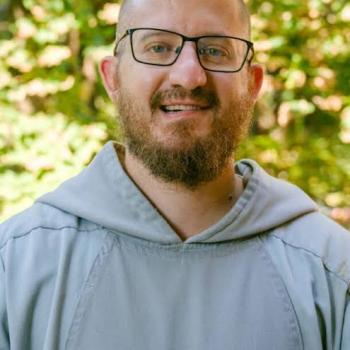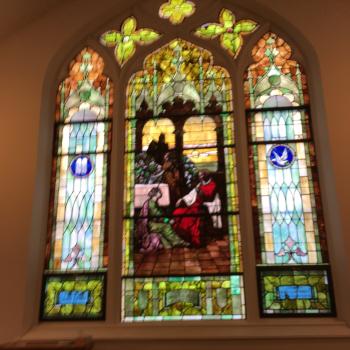We live in a very trying time. Many of the leading nations of the world, and not just the United States, have found themselves in dire straights. The greed of the past is catching up with us, causing many today to experience financial ruin. If, in the recent past, we lived through a season of greed, where wealth could be accumulated almost by desire by those who were willing to do anything to get to it, we now find ourselves in a time of economic decline, a time when people are finding out the cost of the greed of the past. Even if they were not the ones who were greedy, the consequences of social sin are now upon us.
Life can be quite difficult. Money is necessary for survival, and jobs are needed in order to get that money. But, as many people have learned, jobs are not always there. One can prepare for a career to find out the path one expected to take has been blocked. And in a time when general practitioners are no longer wanted, when one must prepare for a specific vocation before being accepted for a career, people who cannot get a job in their profession of choice find themselves not being given a chance in others. If one wants to be a librarian, they must have a degree in library science. If one wants to work in one of the many national parks, they must have a degree in parks and recreation. Even if one has proven themselves capable of learning, so that they can quickly excel in any particular job, it doesn’t matter. They won’t get the job.
In a time such as this, it is easy to despair.
In the midst of such a trial, one must keep faith in God. The things of the present age are temporary. We must not be seduced by them and seek after them in an unchristian manner. How we act both in times of prosperity and in times of difficulty will determine who it is that we are. But, since we are in a time of decline, it is best to read it like St. Antony the Great, who sees such times as when we can prove to God (and to ourselves) our true nature. We must wrestle with ourselves, and not give in to despair. We must prove we stand on the side of righteousness, even if it costs us our lives:
Jesus knew that the devil derives his power from the material things of this world, and He called his disciples and said to them, ‘Lay not up for yourselves treasure upon earth,’ and ‘Take no thought for the morrow; for the morrow will take thought for itself.’ (Matt 6:19, 34.). Truly, my beloved, you know that when there is a fair wind, the captain of the ship boasts; but it is in the time of violent adverse winds that every skilled captain is revealed. Know now of what kind is this time to which we have come.[1]
While we are now in a midst of a time of troubles, not everyone experiences the troubles the same. Indeed, there are still those who are well-to-do and have not been hurt by economic woes, and others, who though hurt, remains fairly well off. Both of these groups of people are still capable of helping those in need, and morally, they are expected to do so. Those who suffer great need in this time of difficulty should be respected as people with real personal worthy. They need to be helped. Those who still are in possession of the wealth are expected to help those who are without. Yet, those who don’t have it must not give in to despair. They must discern God’s will in their situation and follow it without giving up on life. Yes, it is difficult. Indeed, it is very, very difficult. But one must lean on God and acknowledge that it is how one deals with their life now that their eternal destiny will be established. Success, as the world treats it, is not how we are judged. It is what we do with what we have and are given which determines our eternal glory. We can have great success and fame, and use it for good, and it will not be to our condemnation; we can have no success, and give up, and turn against God, and in doing so, create our own damnation. But, the one thing we must recognize, the more we are given, the more that is expected of us. The more wealth we have, the more we are expected to use it in charity. The more knowledge we have, the more we are expected to share it. The more spiritual gifts we have, the more they are meant to be shared with the world to help transfigure it.
On the one hand, those who are poor and in great need have to keep to faith, hope and love. They have to live out the theological virtues, no matter how difficult their situation in life might appear. They need to struggle to be righteous, to do what is good before God, because how they deal with their situation will show how much they have bent their will to God. They are being tried, and it is a difficult trial indeed, but one which can lead to great spiritual heights.
On the other hand, those who continue to possess great resources of their own are the ones who are being tried the most. Will they welcome the stranger into their midst, and give to them what is needed, or will they turn them away with sores, like the rich man did Lazarus? The rich are expected to help their neighbor, no matter who they are, where they have come from, and what it is they have done. The rich must understand that providence gives them riches, not so they view them as possessions meant solely for themselves, but as stewards of God’s own bounty. All things are God’s, including the wealth of the world. They might have struggled to get what they have, but it still doesn’t make it more theirs than anyone else’s. We must realize that the poor also struggle. Indeed, a great many of the poor throughout history have worked much harder than the rich to get far less than the rich out of their work. Riches are but gifts of God, temporary gifts at that, and they are given so that they can be put to use in works of charity. In a society which views one’s esteem in the world based upon how much wealth they have accumulated, we must remember that such glory is easily lost. What is given one day can easily be lost the next, as St John Chrysostom eloquently points out:
Someone achieves glory here. But dishonor, too, succeeds it, and the person who today is [riding] in a carriage is tomorrow in prison. The person who today is accompanied by lictors is tomorrow circled by executioners. The person who today puts fear in everyone is tomorrow in a state more pitiful than that of any captive. The person who brandishes the sword at everyone is himself afraid of this fear and trembles. Here there is youth: but old age, too, succeeds it. There is life, but termination and death, too, await. There are honor, but insults, too, attack. There is safety, but machinations, too, succeed it. There is joy, but grief, too, is mixed with this in turn. A person enjoys security, but is wracked by worry, too. And now these things, now those take hold of the person.[2]
We must not become too attached to what we have. Even in poverty, it is easy to become attached to one’s way of life, to what few possessions one has, and close off one’s access to God. The spirit of detachment, as presented to us by the following example of St Macarius, is exactly what is expected of us:
The same Abba Macarius while he was in Egypt discovered a man who owned a beast of burden engaged in plundering Macarius’ good. So he came up to the thief as if he was a stranger and helped him to load the animal. He saw him off in great peace of soul, saying, ‘We have brought nothing into this world, and we cannot take anything out of this world.’ (1 Tim 6.7). ‘The Lord gave and the Lord has taken away; blessed by the name of the Lord.’ (Job 1.21).[3]
It is understandable why the man or woman of the world, seduced by secularism, expects the law to be absolute, especially if the law is being used to secure their own wellbeing in the world at the expense of others. But the Christian must never let positive law override charity. When the dignity of the human person is put in contrast to the dignity of a man-made border, the human person is to triumph. Whether or not a person has civil rights, they have human rights, and Christians are called to protect them, even if the law does not. Thus, whether the person is in the womb, or someone finding themselves living illegally in a land they were not born in, their rights and needs as a human person override whatever laws which would seek to destroy them. Although they might need to find a way to become regulated in their new land, the Christian is expected to be their benefactor, to help defend against those who would abuse them. When a Christian puts their own selfish greed over human charity, they have shown that in the time of trial, they have turned their back on God. Their true nature has been shown. They need our prayers and pity. They need to have their ice-cold hearts melt, so that they can meet their neighbor in love. If they selfishly keep to themselves and ignore the plight of the oppressed, their stone-cold hearts will not know the love needed for them to be known by the God who is love.
“Gold and silver are corruptible, and belong to this short-lived tabernacle; but righteousness is of that dwelling-place which abides to the ages of ages for man. Therefore the inheritance which your fathers give you is righteousness.”[4] Our Christian inheritance is the righteousness of God, the living flame of love. But we can easily disregard it, turn our backs on it; if we do so, the consequence of our actions is on our heads. St. Antony, that exemplar of Christian charity, warned those who would be cruel to their neighbor that what they do to others will come back and afflict themselves in return. His spirit was one of openness to others, as was so beautifully described by St Athanasius:
Thus, therefore, he warned the cruel. But the rest who came to him he so instructed that they straightway forgot their lawsuits, and felicitated those who were in retirement from the world. And he championed those who were wronged in such a way that you would imagine that he, and not the others, was the sufferer. Further, he was able to be of such use to all, that many soldiers and men who had great possessions laid aside the burdens of life, and became monks for the rest of their days. And it was as if a physician had been given by God to Egypt. For who in grief met Antony and did not return rejoicing? Who came mourning for his dead and did not forthwith put off his sorrow? Who came in anger and was not converted to friendship? What poor and low-spirited man met him who, hearing him and looking upon him, did not despise wealth and console himself in his poverty? What monk, having being neglectful, came to him and became not all the stronger? What young man having come to the mountain and seen Antony, did not forthwith deny himself pleasure and love temperance? Who when tempted by a demon, came to him and did not find rest? And who came troubled with doubts and did not get quietness of mind? [5]
It is because St Antony had struggled hard against his inordinate desires, and overcame them, that he was able to become God’s spiritual instrument to the people of Egypt.[6] Trials and tribulations are nothing to those who have given themselves entirely over to God. While we live in a time and place which glorifies the ego, a Christian cannot live their life with such egotism; they must die to the self. This means that our ordinary hopes and fears, however justified they are, must not be used to undermine our Christian witness. We must stand up for the oppressed, the poor, the needy, no matter where they come from. Even if they break the law in order to survive, we must understand that the laws of men have nothing over the law of human dignity. The greater the division between classes, the greater the responsibility the rich have to make sure everyone is shown what is inherent in human dignity. The rule of law is fine as long as it does not serve to counteract human dignity. But when the law is used to ignore the needy and to excuse human mistreatment, the law is void, and the Christian must live by the higher law of charity. It might cost them much to do so. But that is the cost of discipleship. Christ demands we give our whole self to him. That which we hold back is that which will be used against is in that dread tribunal to come. What will you say to Christ when he asks, “When I was thirsty, when I was hungry, when I was without clothes, when I was without home, what did you do?” Will you say you had the law imprison him or throw him far away from you, or will you say, “I did what I could to help you?” The Lord is not forgetful of how we answer this question. If we truly love Christ, the second response is all that we would give. So why isn’t it?
Footnotes
[1] The Letters of Saint Antony the Great. trans. Derwas J. Chitty (Oxford: SLG Press, 1991), 11.
[2] St John Chrysostom, “On All the Martyrs,” in The Cult of the Saints. trans. Wendy Mayer and Bronwen Neil (Crestwood, NY: St Vladimir’s Seminary Press, 2006) 244.
[3] The Sayings of the Desert Fathers. Trans. Benedicta Ward (Kalamazoo, MI: Cistercian Publications, 1984), 131.
[4] The Letters of Ammonas. trans. Derwas J. Chitty (Oxford: SLG Press, 1995), 23.
[5] St. Athanasius, “The Life of St Antony” in NPNF2(4), 219.
[6] cf. ibid., 199.















